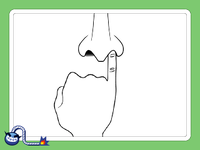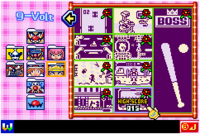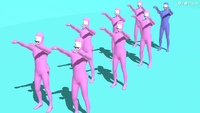Microgame
- Not to be confused with Minigame.
Microgames are simple, short minigames that are the core part of the WarioWare series. They additionally appear in its spiritual predecessor Mario Artist: Polygon Studio. Their name comes from "minigame" and the prefix "micro-." Microgames are mostly created by the fictional company WarioWare, Inc., and these games have extremely stripped-down gameplay. Microgames have the player perform one action or linked set of actions.
Microgames are associated with the catchphrase "instant action", which has been used as part of the marketing for WarioWare, Inc.: Mega Microgame$![1][2], WarioWare Gold[3], and WarioWare: Get It Together![4][5]
Details[edit]
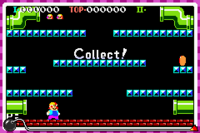
A microgame starts with a quick one or two word instruction (such as "Eat!" or "Rub!") to prompt the player. For example, The Legend of Zelda is a microgame where all the player has to do is move Link to a cave entrance using the directional buttons. Its prompt is "Enter!". Another example is Crazy Cars, which requires the player to make Wario jump over a single car. Its prompt is "Dodge!". Microgames often have a random element; The Legend of Zelda's random element is the position of the cave. Compared to minigames from other series, such as those of the Mario Party series, a microgame is very simple. Starting with WarioWare: Get It Together!, the command for each microgame is voiced by an announcer.
Microgames usually have time limits, which are generally less than five seconds long. However, because microgames can be played at variable speeds, the true measure of that time limit is in beats. A standard microgame is 8 beats long, or 4 seconds at normal speed. The average length of a microgame has been suggested by Nintendo to be five seconds, when in reality it is only four.[6] The timer is depicted as a "bomb". It appears in the lower left of the screen when time is low, with its fuse extending to the right. The fuse runs down on the game's final beats, and the bomb explodes to conclude the microgame. Once time is up, the player has either succeeded at or failed the microgame.
Games of the WarioWare series are divided into stages. The goal of a stage is to play (not necessarily complete) a specific number of microgames of a particular grouping, with the number of microgames that are played being the score. The standard grouping used is all of the microgames that a fictional character created, with that character being the stage's host. Microgames are chosen at random, with some rules regarding their order. Each time the player fails a microgame, they lose a life. Losing all lives results in a Game Over, forcing the player to start over. After beating a stage for the first time, the stage can be replayed with the goal of playing as many microgames as possible before running out of lives.
Types[edit]
Microgames come in three main types, classified by the condition required to clear them:
- Some games require the player to accomplish a task within a limited amount of time. If they do the action presented, a sound bite plays to signify the game's completion; this is usually heard just before the timer runs out and may continue through the return to the score screen.
- Other games require the player to instead survive so that something does not happen before the timer runs out, with the sound bite playing after the score screen returns.
- Finally, there are boss microgames (referred to as Boss Games in WarioWare Gold), which always occur at set points in a stage. Boss microgames are more complex than normal microgames, sometimes featuring multiple phases with different actions, and they lack a time limit. All stages have at least one boss microgame, and that boss microgame must be won to finish a stage for the first time. The boss microgame appears as the final microgame of the initial playthrough, and failing to complete it causes it to reappear without incrementing the score. On later playthroughs of a stage the microgame does not reappear if failed, and if the player wins they regain a life they previously lost.
Additionally, the WarioWare series features several deviations from the normal classifications of microgames. Some microgames last twice as long, either because their actions require more thought to perform or because they are more difficult than other games. Standard microgames of this group last sixteen beats, or eight seconds at normal speed. Some microgames are instead extremely short, lasting just four beats or two seconds at normal speed and generally prioritizing the player's reaction speed. Multiplayer microgames are used to determine who goes first in a multiplayer game or to settle a tie. A few microgames serve as a way to solve control-related issues, with one notable method being that the player must avoid interacting with the console or its buttons at all times to win.
Difficulty[edit]
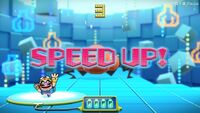
As the player plays more microgames in a stage, the microgames get more difficult in one of two ways. A "Speed Up!" message means all following microgames will run faster, increasing their BPM. This makes it harder to perform the relevant action(s), or even recognize what action has to be performed. In all WarioWare games except for WarioWare: D.I.Y. and WarioWare: D.I.Y. Showcase, a "Level Up" message indicates the microgames will increase in complexity.
All microgames have three levels, with the first level being the most basic and the following second and third levels being more difficult through methods such as adding extra obstacles, adding decoy items which cannot be used to complete the microgame, increasing the variance, or reducing the size of a key item. Level Ups usually appear after playing a boss microgame, and as such usually do not appear during the initial playthrough of a stage. A Level Up resets the speed of the microgames to normal. Once the third level of microgames is reached, subsequent Level Ups are usually replaced by Speed Ups.
Challenge modes, like Thrill Ride and Super Hard, can also further increase the difficulty of a microgame, such as having to complete them without even losing a single life, or completing them at a very fast speed. Modes that also rely on external factors such as distractions (eg. Wario Interrupts) or avoiding getting caught (eg. Gamer) can indirectly make the gameplay more difficult.
It is possible for varying control schemes (such as tilt controls or using the Touch Screen) to be mixed together, as in the case of All Mixed Up and all stages in the Ultra League in WarioWare Gold. As these microgames are played in quick succession, this may require the player to quickly adjust to the next control style, which indirectly makes playing them slightly more challenging. Usually, a guide prompting the next control scheme is displayed before the next microgame, but there are some exceptions (such as the "Ultra: No Guide" mode in All Mixed Up). Similarly, playable characters in WarioWare: Get It Together! may make a microgame slightly harder or easier than intended, as their suitability to a microgame's gameplay depends on how the playable character is controlled.
Index[edit]
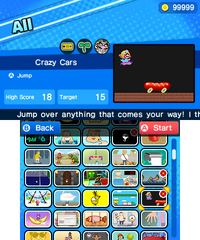
WarioWare series games usually also include a mode, referred to as the Index as of WarioWare Gold, where the player can replay any microgame they have encountered in normal gameplay. Playing every microgame, and thus unlocking every microgame for this mode, is often one of the game's goals. The microgames are by default sorted in alphabetical order, though boss microgames are always listed last and usually are distinguished from normal microgames visually.
In this mode, the player plays.a "pseudo-stage" with the usual rules on lives but only using a chosen microgame. Boss microgames do not grant lives in this mode. The three levels of the microgame are played on loop, and every third microgame played increases the speed of all successive microgames. Speed Up!s and Level Ups messages do not appear even though both values are changing. WarioWare games excluding WarioWare: Smooth Moves, WarioWare: D.I.Y., WarioWare: D.I.Y. Showcase, Game & Wario and WarioWare: Move It! give each microgame a specific score, and the player can earn some kind of credit for reaching or exceeding that score in this mode.
Doing so for every microgame is often another one of the game's goals. The longer and more difficult the microgame, the lower this minimum score usually is, with boss microgames usually having rather low minimums. Similarly, easier and shorter microgames usually have higher minimum scores. The exclusive multiplayer microgames from Mega Party Game$! do not have these minimum scores.
Notable appearances[edit]
WarioWare series[edit]
WarioWare: Twisted![edit]
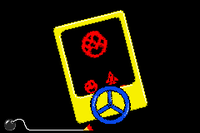
WarioWare: Twisted! features 223 microgames that are played using the Game Boy Advance's Tilt Sensor, as opposed to using button controls from the previous entry.
WarioWare: Touched![edit]
WarioWare: Touched! has microgames that require the use of the Nintendo DS's touch screen to play. Additionally, some microgames require blowing into the system's built-in microphone, as in the case of the ones seen in the Mic Rocking stage.
WarioWare: Smooth Moves[edit]
WarioWare: Smooth Moves features microgames that make use of the Wii Remote's motion sensor in various ways. A similar control scheme would be later used in WarioWare: Move It!, this time with the Nintendo Switch's Joy-Cons.
WarioWare: Snapped![edit]
WarioWare: Snapped! makes use of the Nintendo DSi's built-in camera, mainly to create the player's silhouette used in the microgames. The player needs to move around and perform actions or gestures to win a microgame. Notably, this game does not feature any difficulty levels or speed ups, as opposed to previous entries.
WarioWare: D.I.Y.[edit]
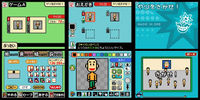
- Main article: Super MakerMatic 21
WarioWare: D.I.Y. is unique in that the player is able to create their own microgames and share them (via Nintendo Wi-Fi Connection) with other players. Graphics, records, logic routines and control schemes can be created for their custom microgame. Like Touched!, the main control scheme for these microgames is the Touch Screen. Additionally, sample microgames are also included, developed by former members of WarioWare, Inc. who now work at Diamond Software. The player is also able to download microgames via Nintendo Wi-Fi Connection, including weekly games shared by Nintendo and even "Big Name Games" created by famous people.
In addition, its companion game WarioWare: D.I.Y. Showcase allows players to play microgames that were created in D.I.Y., but it does not require the original game itself to be played. Microgames can be transferred between the DS and the Wii, and vice versa.
Game & Wario[edit]
In Game & Wario, 22 microgames appear in 9-Volt's "Gamer" minigame, two of which (Gold Digger and Sole Man) return from Mega Microgame$!.
WarioWare Gold[edit]
WarioWare Gold features a lot of returning microgames from past entries in the series leading up to it. There are three major classifications for each microgame, and these are also used for all three major leagues in the story mode:
- Mash is represented by a yellow handheld system with buttons, and features microgames that require the player to use the
/
and
buttons, much like in Mega Microgame$!.
- Twist is represented with a handheld screen surrounded by blue curved arrows, and requires the player to tilt the Nintendo 3DS system to control them, much like in Twisted!.
- Touch is represented by a pink stylus touching a handheld screen, which requires the player to use the Touch Screen to play these microgames, like in Touched!.
Additionally, microgames under the "Mic" control type also appear, which require the use of the built-in microphone on the system to play much like in the Mic Rocking stage in WarioWare: Touched!. These microgames are signaled with a "blowing lips" symbol as well as the voice prompt "Blow!". The game also features shorter microgames under the "Pop-Up" genre, which are associated with Fronk.
The term "Ultra" in this game is used to refer to all three microgame play styles mashed up together into one single stage, as in the case of the stages in Ultra League and in All Mixed Up's Ultra mode. The player is usually prompted the control style they are about to expect for the next microgame with a female announcer shortly before it begins.
WarioWare: Get It Together![edit]
WarioWare: Get It Together! introduces the mechanic of controlling various characters in the WarioWare series within the microgames and using their unique abilities to beat them. Some microgames will also be changed depending on the character, and their difficulty may depend on the character's play style, hence they may be classified as a "good" or "bad" fit for some microgames. It also introduces a woman's voice that announces the command before every microgame.
Other appearances[edit]
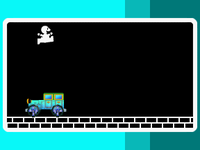
Prior to the WarioWare series, eight microgames have also appeared in the "Sound Bomber" minigame included with Mario Artist: Polygon Studio. All of these microgames also reappear in some way or another in WarioWare, Inc.: Mega Microgame$!, albeit with completely different assets.
Outside of the WarioWare series, microgames are used in the WarioWare, Inc. stage in Super Smash Bros. Brawl, Super Smash Bros. for Nintendo 3DS, and Super Smash Bros. Ultimate. If a player wins the microgame, they are rewarded with item effects, including growing (Super Mushrooms) and becoming invincible (Super Stars).
In Mario Party Advance, the term "microgame" can be applied to any small challenge given in that game's quests. As such, the microgames there may vary widely in style, purpose, and simplicity; completing a microgame typically rewards the player with a Gaddget.
Microgame themes[edit]
Microgames in the WarioWare series are typically assigned to stages based on a specific theme (previously known in WarioWare Inc.: Mega Microgame$! as genre). WarioWare Inc.'s employees will usually create microgames around themes that they find interesting, and nearly all of them have signature themes that they follow in multiple titles.
While microgame themes are not used in Twisted!, Touched!, Smooth Moves, Snapped! and Move It!, stages in these respective games are themed around variations of the title's main control scheme. Most of these titles were released early into the lifespan of their respective hardware, and were intended to show the new gimmicks off. Despite this, a few themes are retained in some way or another, notably Nintendo Classics and Anything Goes, thus their associated stage names are also listed underneath their respective names in the table below.
The following table lists all commonly-recurring microgame themes, as well as less recurring ones:
| Microgame themes throughout the WarioWare series | ||||
|---|---|---|---|---|
| Name | Other names | Host | Sample | Description |
| Recurring themes | ||||
| Intro Games | N/A | Wario | 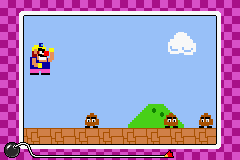 Super Wario Bros. |
These microgames are generally simple, meant to introduce the game's mechanics. This is one of Wario's two signature themes, and typically feature him in some way. Often, the Intro Games may appear sporadically in Wario's Anything Goes stage, and in WarioWare, Inc.: Mega Microgame$!, they are also found in Dribble & Spitz's stage, as well as Kat & Ana's stage. |
| Sports | N/A | Jimmy T Dr. Crygor, Young Cricket & Master Mantis (WarioWare Gold) |
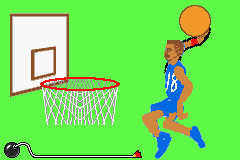 Slam Dunk |
Microgames themed around various activities recognized as sports in the real world. It is the signature theme for Jimmy T, though it is also used by Dr. Crygor and Young Cricket & Master Mantis in WarioWare Gold. |
| Fantasy | Sci-Fi (prior to WarioWare Gold) | Dribble & Spitz Ashley, Red, Orbulon (WarioWare Gold) |
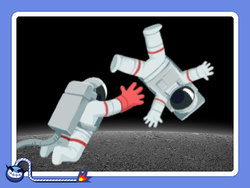 Gravitational Pull |
Microgames with fantastical elements such as magic, space, and monsters, or are generally unrealistic. Some microgames in this theme also involve concepts based in feudal Japan, such as ninjas and samurai. It is the signature theme for Dribble & Spitz, though it is also used by Ashley & Red and Orbulon in WarioWare Gold. |
| That's Life | Strange (prior to WarioWare Gold) | Mona Penny, Kat & Ana (WarioWare Gold) |
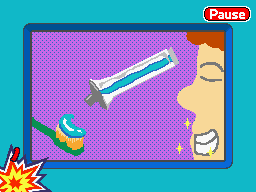 Tooth Haste |
Microgames that commonly depict normal everyday things, sometimes in a strange manner, or otherwise involve concepts that do not fit under any other theme. It is the signature theme for Mona, though it is also used by Penny and Kat & Ana in WarioWare Gold. |
| Nintendo Classics | Nintendo (Mega Microgame$! [in-game], Mega Party Game$!, Smooth Moves, D.I.Y., Move It!) Spintendo Classics (Twisted!) Retro Action (Touched!) Stage Names: The Multiplayer Test (Smooth Moves) Quest in the Dark (Move It!) |
9-Volt, 18-Volt, 5-Volt | 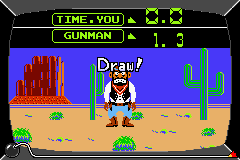 Wild Gunman |
Microgames based on games and products developed or published by Nintendo. It is the signature theme for 9-Volt, 18-Volt, and 5-Volt. With the exception of Snapped!, every title has at least one game based on the Super Mario franchise. |
| Nature | N/A | Kat & Ana | 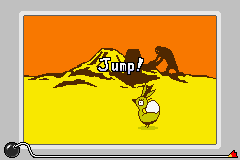 Crack Down |
Microgames themed around animals and plants. In D.I.Y. Showcase, only animal-themed games are present. It is the signature theme for Kat & Ana. |
| Anything Goes | Spandex Challenge (Twisted!) Super Zero (Touched!) All Good (Smooth Moves)[7] |
Wario (May host under an alternate persona or copy of himself) |
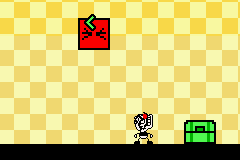 Wario's Adventure |
Wario's second signature theme is a mixture of the game's prior themes; though, much like his first signature theme, these microgames prominently feature Wario in some way. Unlike the Intro Games theme, the Anything Goes theme is meant to be much more challenging, as it's typically the final theme in the game. In later games, this set is listed under an alternate form or copy of Wario, though the original is the one who developed them. |
| Less recurring themes (1-2 appearances) | ||||
| Reality (Mega Microgame$!, Mega Party Game$!) |
N/A | Dr. Crygor | 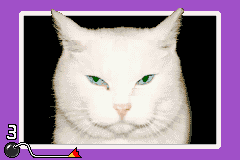 Cat Nap |
Microgames containing photorealistic graphics. Despite the name, these microgames are not necessarily more realistic than others. This theme only appears in Mega Microgame$! and Mega Party Game$!, where it is hosted by Dr. Crygor. |
| Food (D.I.Y., Get It Together!) |
N/A | Ashley, Red | 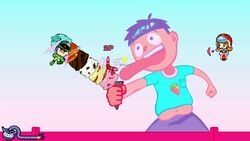 Ice-Cream Lean |
Microgames themed around various food items and related things. It is the signature theme for Ashley and Red. This theme was introduced in D.I.Y. |
| High Tech (Get It Together!) |
N/A | Dr. Crygor | 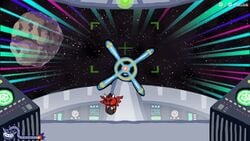 Collision Course |
Microgames themed around modern and futuristic technology. It is Dr. Crygor's theme in Get It Together!, replacing the Reality theme. |
| Culture (Get It Together!) |
N/A | Orbulon | 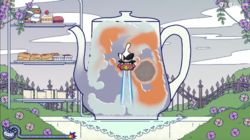 Tempest in a Teapot |
Microgames themed around landmarks, cultural items and traditions from around the real world. It is Orbulon's theme in Get It Together!, replacing the IQ theme. |
| Special themes | ||||
| IQ (Mega Microgame$! to Twisted!, D.I.Y.) |
Time Warp (Twisted!) | Orbulon | 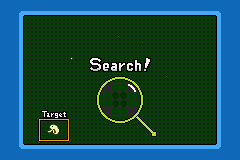 Petri Panic |
Microgames with extended timers, which involve making the player think (hence the name) or objectives that take longer to complete. It is the signature theme for Orbulon. Starting in Touched!, this theme has dissipated and microgames of this nature can be found in nearly every set. Despite this, a dedicated set still appears in D.I.Y., with some games now lasting the standard amount of time. |
| Pop-Up (Twisted!, Gold) |
Frantic Fronk (Twisted!) | Fronk | 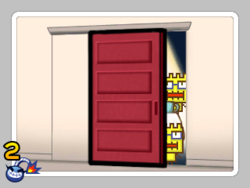 Sliding Doors |
These microgames only appear in Twisted! and Gold, and have particularly short time limits. It is the signature theme for Fronk. Similar to Intro Games and Anything Goes, these games always include Fronk or the Fronks. |
| Mic (Touched!, Gold) |
Mic Rocking (Touched!) | Mike | 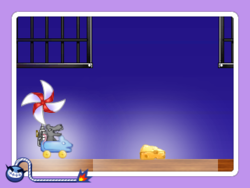 Hit the Gust |
Exclusive to Touched! and Gold, these microgames involve blowing into the microphone on the Nintendo DS/3DS. It is the signature theme for Mike. |
Lists of microgames[edit]
- WarioWare, Inc.: Mega Microgame$! and Mega Party Game$! - 213 microgames
- WarioWare: Twisted! - 223 microgames
- WarioWare: Touched! - 192 microgames (One returning, one Japanese-only, one international-only)
- WarioWare: Smooth Moves - 205 microgames
- WarioWare: Snapped! - 20 microgames
- WarioWare: D.I.Y. - 116 microgames (Two returning, two Japanese-only, two international-only)
- WarioWare: D.I.Y. Showcase - 78 microgames (Two Japanese-only, two international-only)
- WarioWare: D.I.Y./D.I.Y. Showcase downloadable microgames - 153 microgames (101 Weekly Games, 52 Big Name Games)
- Game & Wario - 22 microgames (Two returning)
- WarioWare Gold - 316 microgames (262 returning)
- WarioWare: Get It Together! - 222 microgames (Four returning)
- WarioWare: Move It! - 223 microgames (Two returning)
Names in other languages[edit]
| Language | Name | Meaning | Notes |
|---|---|---|---|
| Japanese | プチゲーム[?] Puchi Gēmu |
Petit Game; officially romanized as "Petitgame"[8] | |
| Dutch | Microgame[9] | - | |
| French | Micro-jeu[?] | Microgame | |
| German | Mikrospiel[10] | Microgame | |
| Italian | Minigioco[11] | Minigame | |
| Korean | 미니게임[?] Mini Game |
Mini Game | |
| Romanian | mini joc[12] | mini game | |
| Spanish | Microjuego[13] | Microgame |
References[edit]
- ^ "With profits as the top priority, Wario and his friends have created a collection of more than 200 super-fast, instant-action games that are designed to push your reflexes to their limits." – 2003. WarioWare, Inc.: Minigame Mania European instruction manual. Nintendo (English). Page 4.
- ^ "[WarioWare, Inc.: Mega Microgame$!]'s emphasis was on instant action, and [WarioWare, Inc.: Mega Party Game$!] on multiplayer gameplay." – 1. With One of These Remotes, You Can Do Anything. Nintendo (English). Retrieved February 28, 2025.
- ^ "WarioWare Gold is about action. Instant action!" – Wario (2018). WarioWare Gold digital instruction manual. Nintendo (English). Page 2.
- ^ "Look, instant action. Think fast! And act fast to win. That's how microgames work" – Wario, Nintendo of America (Aug 25, 2021). WarioWare: Get It Together! - Overview Trailer - Nintendo Switch ("0:29"). YouTube. Retrieved February 28th, 2025.
- ^ "My new game is full of instant action! These are microgames! So you'd better think fast, and act fast too!" – Wario, Nintendo of America (Sep 10, 2021). WarioWare: Get It Together! - Launch Trailer - Nintendo Switch. YouTube. Retrieved February 28th, 2025.
- ^ "WarioWare: Touched! at Nintendo :: Games." Nintendo.com. February 14, 2005.
- ^ "I might be small, but I'm still the best! Here's proof: I've mastered all the forms! Bwahahaha! I'm All Good! And between you and me, I make an appearance in all my games! As my biggest fan, <player's name>, this will make you insanely happy!" - Temple of Form description for Tiny Wario's set, WarioWare: Smooth Moves
- ^ Nintendo Music
- ^ WarioWare: Smooth Moves onder de loep
- ^ WarioWare: Smooth Moves im Test
- ^ Test di gioco di WarioWare: Smooth Moves
- ^ "O multitudine de mini jocuri noi, bazate pe mișcare – jocuri amuzante care durează doar câteva secunde – sunt ale tale de stăpânit. WarioWare Move it[sic] este disponibil acum!" ("A multitude of new, motion-based mini games—funny games that take only a few seconds—are yours to master. WarioWare Move it is available now!") – CDMediaSE (November 3, 2023). Post. Facebook (Romanian). Retrieved January 20, 2026. (Archived January 20, 2026, 16:16:15 UTC via archive.today[deprecated link].)
- ^ Jugamos a: WarioWare: Smooth Moves
